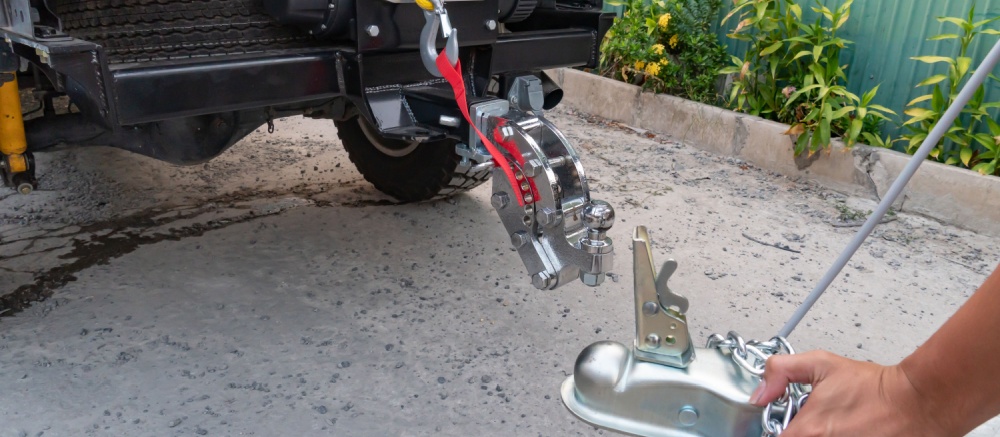Installing a trailer hitch may seem straightforward, but there are several common mistakes that can lead to safety hazards and vehicle damage. Whether you’ve installed a hitch before or are a first-time installer, it’s important to be aware of these common mistakes to avoid them.
This guide discusses the five most common mistakes to avoid during hitch installation and provides detailed guidance on ensuring a successful and secure installation.
Mistake 1: Choosing the Wrong Hitch
One of the most critical mistakes when installing a trailer hitch is selecting the wrong type or size of hitch for your vehicle and towing needs. You must consider your vehicle’s towing capacity and the weight of the trailer or equipment you plan to tow. Choosing a hitch not rated for your load can result in dangerous incidents on the road.
Selecting the wrong class of hitch can result in improper weight distribution and handling issues. To avoid this mistake, thoroughly research your vehicle’s towing capacity and consult with a reputable hitch dealer to ensure you select the appropriate hitch for your specific needs.
Mistake 2: Improper Installation
Improper trailer hitch installation can compromise its structural integrity and pose a significant safety risk. This mistake often occurs when individuals attempt to install a hitch without the necessary tools, expertise, or understanding of the vehicle’s frame and structural components. Follow the manufacturer’s installation instructions precisely and use the recommended hardware and mounting points.
To avoid this mistake, consider seeking professional installation services from a certified mechanic or hitch installation specialist. If you choose to install the hitch yourself, take the time to thoroughly read and understand the installation manual and ensure that you have the appropriate tools and equipment for the job.
Mistake 3: Neglecting Wiring and Electrical Components
A common oversight when installing a trailer hitch is neglecting the wiring and electrical components required for proper trailer operation. Many trailers require electrical connections for brake lights, turn signals, and other essential functions. Failing to install or maintain these electrical components can lead to unsafe conditions and potential legal consequences.
To avoid this mistake:
- Carefully inspect the vehicle’s electrical system and ensure it is compatible with the trailer’s wiring requirements.
- Install a wiring harness and trailer connector to integrate seamlessly with your vehicle’s electrical system if necessary.
- Test the trailer lights and signals before each towing operation to confirm they function correctly.
Mistake 4: Inadequate Rust Protection
Installing a trailer hitch without adequate rust protection can lead to corrosion and structural degradation over time, especially if you frequently tow in harsh weather conditions or on salt-treated roads. Rust and corrosion can weaken the hitch and compromise its load-bearing capacity, posing a serious safety hazard.
To avoid this mistake, consider applying a high-quality rust-resistant coating or paint to the hitch and mounting hardware before installation. Regularly inspect the hitch for signs of corrosion and take care of any issues you might find to prevent further damage. Investing in a durable, rust-resistant hitch can provide long-term protection and peace of mind.
Mistake 5: Ignoring Maintenance and Inspection
Once a trailer hitch is installed, it’s important to prioritize regular inspections and maintenance to ensure its continued safety and functionality. Neglecting to inspect the hitch, mounting hardware, and associated components can lead to wear and damage that may compromise towing performance and safety.
Establish a routine maintenance schedule for your trailer hitch and associated components to avoid this mistake. Inspect the hitch for signs of wear, corrosion, or damage and address any issues promptly. Lubricate all moving parts as recommended by the manufacturer and periodically check the torque of mounting hardware to ensure it remains secure. This process can prolong the life of your trailer hitch and ensure safe towing experiences.
Trust the Pros At Calgary Hitch Shop for Trailer Hitch Installation in Calgary
Installing a trailer hitch requires careful consideration, attention to detail, and knowing the best practices to ensure safe and reliable towing performance. It can be challenging, especially if you’re not savvy about this kind of work.
By avoiding the common mistakes outlined in this guide and following the manufacturer’s guidelines, you can enjoy peace of mind knowing that your trailer hitch is installed correctly and ready for the road.
If you want to skip the DIY and worry about whether you’ve done it right, our expert installers can get the right hitch for your vehicle installed properly. Getting expert trailer hitch installation in Calgary has never been easier at Calgary Hitch Shop.


